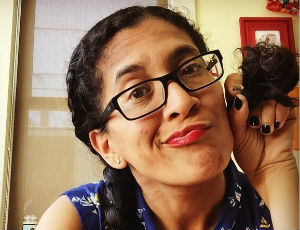I have a passion for metal music. I really fell in love with this style of music in middle school. It was an awkward time for me, but the music and culture really gave me a place and a voice that I didn’t know I had.
That’s why I was really excited when I heard about Celia C. Pèrez’s debut novel The First Rule of Punk, which explores a middle school girl’s love of punk and her struggle to fit in.
Pèrez is a fresh new face in children’s literature, and she sure is gaining a lot of attention for her novel. Let’s hear from the author herself about her amazing book!
Author Q&A
Where did you get the idea for this book?
The seed for this book came from my own experiences as a bicultural child of immigrants who always felt like an outsider growing up. I wanted to write about that universal experience of questioning where you fit in the world through the eyes of a quirky girl who is dealing with external and internal pressures to conform to expectations based on ethnicity, gender and plain old school culture. I also wanted to write a book with a Latina protagonist that wasn't issue-driven, that was fun and that showed that Latinos are not a monolith, that there are so many different ways to be Latino. I've been into punk and zines for a very long time, so I pulled those interests into the narrative as ways for this character to work out the things she's experiencing. So much of punk culture is about creating what you don't see and about doing things yourself, often outside of what may be the typical avenues for action, and this is important to the Malú's developing sense of self.
What was your favorite book when you were growing up?
Witch's Sister by Phyllis Reynolds Naylor. It was my favorite not only because it's deliciously spooky from the very first line, and I loved spooky books as a kid (still do), but because it was the first book I ever purchased. My family didn't have money to spend on things that weren't necessities—although I would argue that books are necessities—so to be able to buy and own a book was special. I ordered it from a Troll book order form when I was in the third grade. I still have my yellowed, tattered and much-loved copy!
How old were you when you started writing?
My earliest memory of writing for "publication" was when I was in the third grade. All the third-graders had to write an essay on what our school meant to us. One would be selected and that student would get to read it at our graduation (our school only went to third grade). Mine was chosen. It was the first time I had some idea that writing was something I was good at and that I enjoyed doing. It was when I first discovered that writing gave me a sense of power that I didn't often feel in my day-to-day life. I would go on to write Beezus and Ramona-inspired stories from there!
What is your favorite word?
I was born in the United States, but my parents were not—my dad came from Cuba and my mom from Mexico—so my first language was Spanish. It's cool to know that I have access to this whole other language that lives in my brain. Sometimes I will randomly think of a word in Spanish that I haven't thought of or used in a long time. I especially like thinking of words that I would rarely use in daily conversation but that have been ingrained in my memory, words like "cohete" (rocket) and "paraguas" (umbrella, which literally translates to "water stopper"). One of my favorites is "zanahoria," which I love because not only is it a really great sounding word, but unlike "paraguas," it isn't a word you can easily break down to figure out its meaning. Look it up!
What is your favorite book about Chicago?
My two favorites books about Chicago are The House on Mango Street by Sandra Cisneros and Maud Martha by Gwendolyn Brooks. On my to-do list: read more children's books about Chicago!
Readalikes
If you're like me and can't wait for a follow-up to this masterpiece, get your hands on some of these readalikes.
Amina's Voice: An amazing story about an 11-year-old songbird who loves to sing but struggles to find her voice and her place in her native culture.
Clayton Byrd Goes Underground: A riveting tale about a blues-loving boy who tries to cope with the death of his grandfather, who taught him everything he knows about the blues, and his strict mother, who has forbidden him to play it.
Enchanted Air: You must read this brilliant memoir in verse about the author's experiences as a young girl torn between two cultures. This mesmerizing book will resonate with many readers who have struggled with finding their identities in a place where they feel at home but their parents don't.




Add a comment to: Meet Chicago Children’s Author Celia C. Pèrez